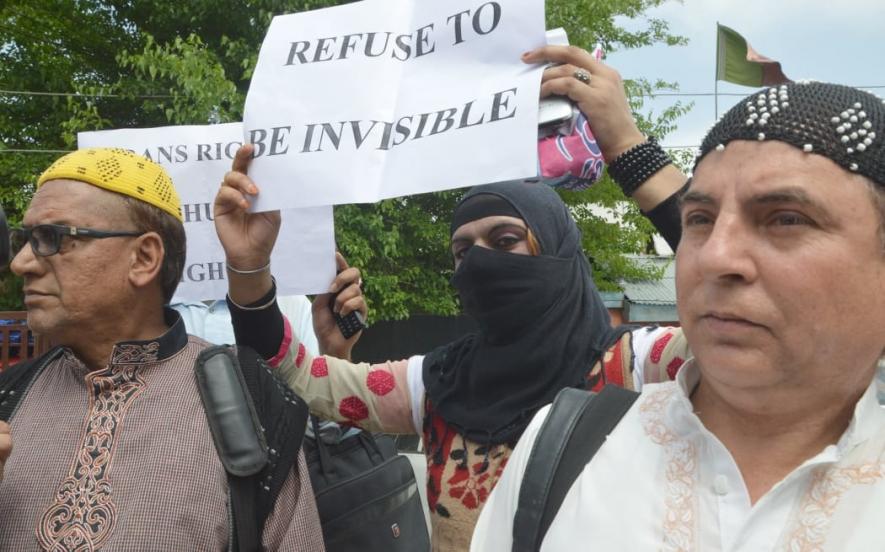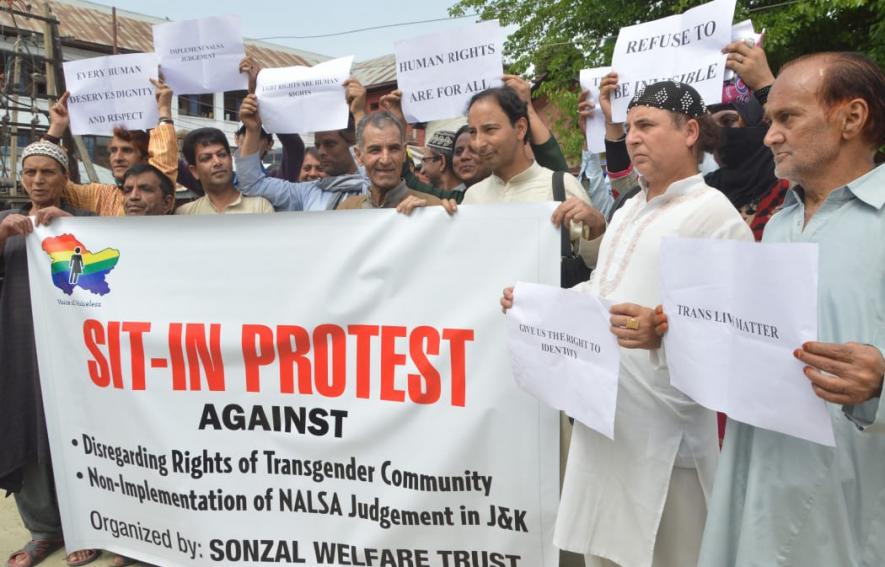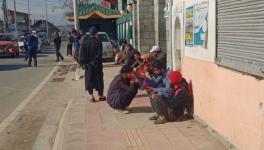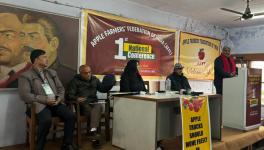Raziya: Meet the Person Who Changed the Lives of Transgenders in Kashmir

On a bright sunny early morning late last month, a Kashmiri transgender sat with her legs crossed with tears rolling down her face in the compound of Ziyarat Naqshband Sahab, which is in the middle of a congested locality in the heart of the old city of Srinagar.
The beams of yellowish sun pierced through the big holes of the green roof in the more than 600-year-old shrine and fell on Raziya’s face, as she prayed with her hands folded. The murmurs of believers fill the air every morning and evening here, without matter what is happening in the other parts of the city, the capital of the war-torn region of the Kashmir valley.
“Oh God,” Raziya murmured, with her chin resting on the palm of her hand, “whatever I am today it is because of you and your benevolence.”
The story of Raziya is a saga of never-ending humiliation, cultural taboos, and a struggle to live every day in a conservative society, that has, for hundreds of years, like other places in Asia, treated transgender with shame and a feeling of guilt. Her life, too, is the story of that struggle spanning over four decades.
Born in 1970, Raziya was raised as a boy by her parents, an identity she was always hesitant about while growing up. But given the cultural taboo attached to transgenders in Kashmir, it is hard for many at an younger age to come out in the open and declare themselves a transgender. In Raziya’s case also, like many others in Valley, the Muslim majority decides her gender and identity.
“I grew up as Riyaz,” said Raziya. But as she finally got out of her family’s house, she gave herself a new name. “I am now Raziya.”
But her journey from Riyaz to Raziya was not easy. It is full of painful memories. One such memory that still haunts Raziya is from her school days. Considering her as a boy, her father (whose name she doesn’t want to mention) admitted her in a boy’s school. Unable to offer any resistance to her father, she joined the school. Her feminine voice and way of walking didn’t go unnoticed by her schoolmates, who began taunting her.
It was more of a punishment than an opportunity to educate. There was no one who could understand Raziya and the pain she was going through. Her room was her small world, where she would lock herself and wear clothes of her younger sister and put on makeup like other women. The rest of her time she would spend helping her mother in the kitchen. She enjoyed cooking, cleaning, and washing dishes. “That is why I was helping my mother. Many times, my father stopped me from doing that but I continued,” she said.
Raziya was balancing her life between school, kitchen, prying eyes and her elder brother and father. After passing 9th standard, Raziya found it tough to continue because her classmates used to molest her in the absence of teachers.
“I was feeling like they are raping me but I kept quiet,” said Raziya in tears and a sense of humiliation visible on her face. She decided to drop school on the pretext of not being interested in studies any longer. It was the end of the dream of being a dermatologist which once she had.
However, even that didn’t help for long. On a day, when curfew was imposed across the valley, Raziya went to her room after lunch. She got dressed and applied makeup, unfortunately, she had forgotten to bolt the door. Her father entered the room and saw Raziya dressed as a girl. In the shock of that encounter, her father slapped her, and hearing the angry voices, her family members rushed to the room.
“Without speaking to me, my mother, sister, and brother started beating me. They kicked and punched me. I kept my face down to the ground and held my head in my arms. They even tore my clothes,” Raziya recalls. They continued beating her and Raziya’s father dragged her by her hair to the kitchen and gave her electric shocks which made her unconscious. When she gained consciousness, she found herself in her room where every shelf had been searched and all secret things had been taken away.
She struggled with pain to stand up and reached the door, only to find it locked. Her parents entered after sometime to warn her that “If we found those things again, I’ll kill you and frame it as a suicide.” Raziya was jailed in her own room and didn’t step out for months. However, this period of confinement helped build her confidence and belief in herself.
One-night Raziya made up her mind to leave the house, packing her things – few pairs of Shalwar kameez, socks and the slippers she was wearing – just enough to carry in a small school bag, Raziya jumped out of the window at night and left home.
Walking aimlessly, she was finally able to breathe free. She walked continuously for hours, and when she finally decided to rest she had nothing but her bag under her head for some comfort in the rusty passenger shed. After waking up, she continued her journey, a journey in which she was alone to face the world’s good and worst situations.
With every step, Raziya kept thinking what next? “There was no one to whom I could turn to for help. But I decided to go somewhere and work to give a shape to my life. No doubt there were different challenges to face but I was ready to face them,” Raziya said.
The first place Raziya went to was one of the main bus stands of Kashmir, Batamaloo, in the heart of the city. Being a very busy bus stand, there were a large number of small business establishments and it wasn’t difficult for Raziya to get a job.

Initially, she worked as a labourer, loading luggage on the buses and she managed to rent a room in Hawal, an area of the old city in Srinagar. The job Raziya was doing, was not enough to fulfil her dreams and live the life she wanted to. In the new locality, she introduced herself as “Raziya” for the first time. Raziya started living like a woman. She was free to live and wear clothes as she desired. However, people continued to ridicule her, but she didn’t pay heed to taunts and focused on her work.
“It wasn’t new for me. When my family didn’t support me how could I expect it from strangers,” said Raziya. People generally maintained a distance from her. She too kept to herself and didn’t have any friends.
She tried various jobs, from working as a salesmen to doing menial jobs, but was unable to continue on a job for more than three months.
Raziya’s neighbour, Abdul Ahad Kozgar, who was a tailor by profession was kind to her and offered to teach her tailoring, which she readily accepted.
Raziya learned quickly the skill and worked hard at it. Within a few months, she was able to stitch a suit without Ahad’s guidance. Under Ahad’s guidance, Raziya specialized in ladies tailoring. This became a way for her to make female friends.
Her work was appreciated and her customers became her friends. Soon her circle of friends grew, one of which (who wishes to remain anonymous) was a makeup artist and hairstylist.
She invited Raziya to visit her parlour where she could spend time and meet more people. Unaware that something new awaited her, Raziya went to the parlour one Sunday. Raziya’s friend offered to teach her make-up and other things so that she could make more money.
“I was happy that I was going to learn new things and earn more money, but my master’s consent was required. He always acted like my father,” Raziya said.
Ahad permitted Raziya to go to the parlour on Sundays. Playing with colour was something that she liked since childhood, so it was easy for Raziya to learn the trade. She learnt bridal makeup, pedicure, manicure, hairstyling and all the things a beautician required to know.
“My friend used to sent me to do bridal makeup where I was treated in a different way. People started respecting me. My life was entering into a new phase, where not only my financial condition was improving but I was able to make myself recognised in society,” she recalls.
Raziya was good at balancing between tailoring and working as a beautician. She was earning enough money, soon she bought the same house which she had been renting.
This marked her entry into the new world in which she was flexible to do anything she wanted to. While visiting weddings for bridal makeup, she encountered people of her own community, who used to dance at the wedding ceremonies.
“I interacted with many of them and found a painful story behind every seemingly smiling face. I asked them if they want to learn some different skills. They agreed readily, almost as if they had been waiting for me,” said Raziya with a smile on her face.
With help of the new people she met, she went to many localities and found many people who were transgenders. Raziya decided to give them shelter in her house and train them. They learnt different skills, dancing, singing, makeup, hairstyling (ladies hairstyling), tailoring and more, under the able guidance and mentoring of Raziya.
She wanted to make sure the rest also made something of their lives, earned the respect of the society, and were able to live with pride. She kept an eye on everyone’s income and made sure no one misused it.
Raziya had managed to add more to the identity of the transgenders from being mere matchmakers, across Kashmir. Almost all of Raziya’s ‘companions’, with continued hard work and struggle, were able to manage their expenses and even buy a two-room house in the same locality.
They have finally managed to move out of the social stigma and harassment. They are able to live normal lives, having relationships with men, wearing modern and branded clothes, previously not seen in Kashmir, amongst the transgenders.
After the death of Ahad, Raziya started taking care of his shop and gives the due share of the income to Ahad’s family.
“Acceptance starts at home, then relatives and then society. They live away from home so that their families can live happily. It is time to accept the ‘transgender’ without ridiculing them and raising questions about their existence,” said Raziya with a smile on her face.
On September 6, the Supreme Court announced a landmark verdict in Delhi, as jubilant crowds cheered and rights activists hugged one another, overcome with emotion. The Court has struck down a colonial-era law criminalizing consensual gay sex, overturning more than 150 years of anti-LGBT legislation. Section 377, an archaic law was imposed by the British rulers that penalized intercourse between the same sex had carried a maximum sentence of life imprisonment.
“Now we don’t need to hide our relations from the public. No doubt we won’t be punished by the law for maintaining a relationship but the question is will society accept it,” said Raziya.
Get the latest reports & analysis with people's perspective on Protests, movements & deep analytical videos, discussions of the current affairs in your Telegram app. Subscribe to NewsClick's Telegram channel & get Real-Time updates on stories, as they get published on our website.
























